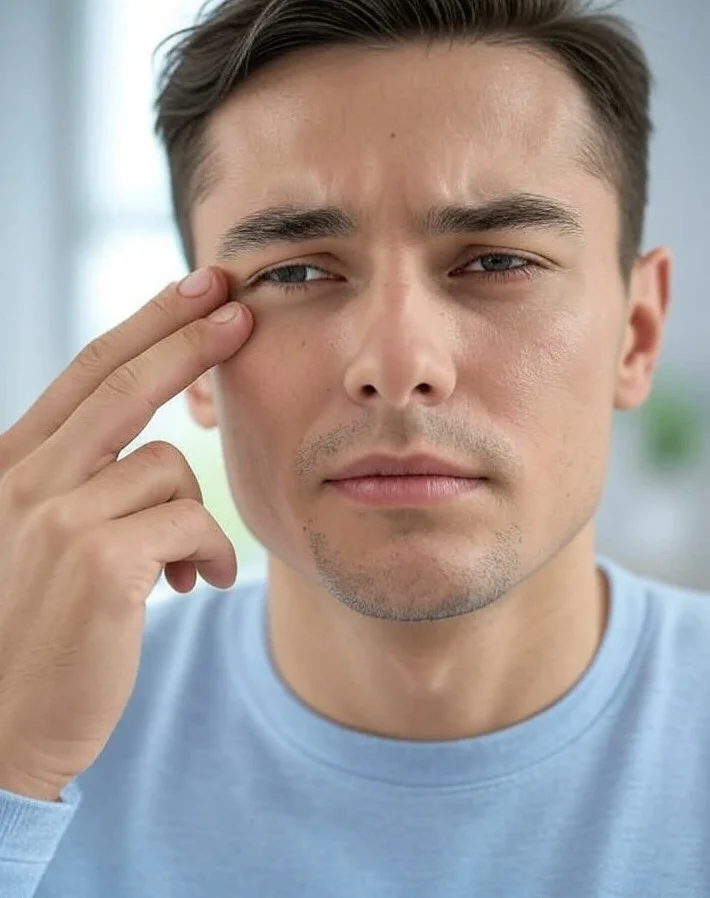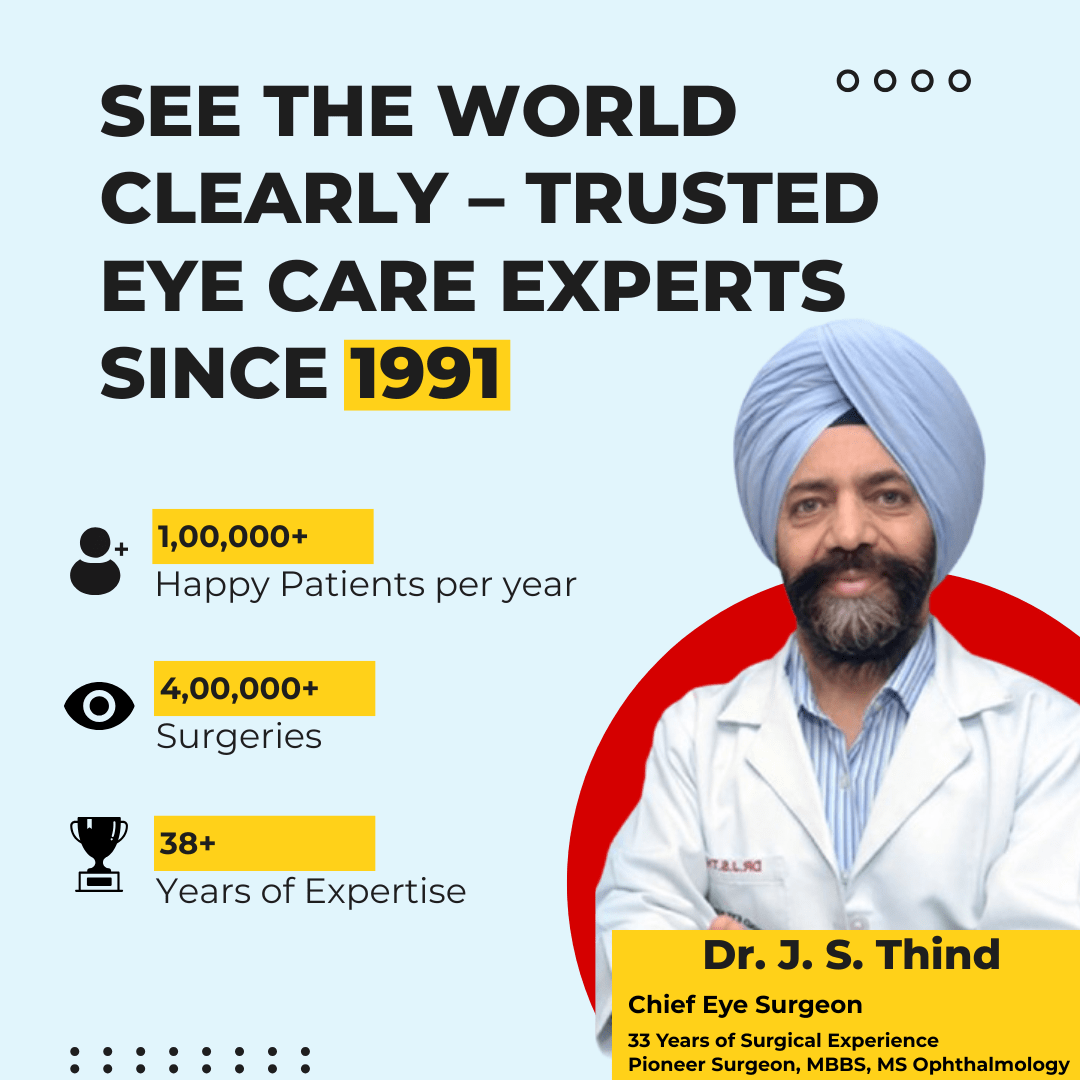Eye allergies are a common concern, especially during seasonal transitions when pollen, dust, and environmental irritants are at their peak. For many people, red, itchy, or watery eyes disrupt daily activities and lower the quality of life. If left untreated, allergies can even lead to more serious complications. At Thind Eye Hospital, Jalandhar’s leading eye care center, we provide advanced eye allergy treatment and tailored solutions to keep your vision clear, comfortable, and healthy all year round.

What Causes Eye Allergies?
Eye allergies, or allergic conjunctivitis, occur when your eyes overreact to harmless substances called allergens. These may include:
- Pollen from grass, trees, or weeds
- Dust mites and household allergens
- Pet dander
- Mold spores
- Smoke, perfumes, or air pollution
- Certain cosmetics or even eye drops
When exposed to these triggers, the immune system releases histamines that cause redness, swelling, itching, and discomfort. Understanding the cause is the first step in finding the right eye allergy treatment.
Common Symptoms Requiring Eye Allergy Treatment
Recognizing allergy symptoms early helps prevent them from worsening. Watch for:
- Red, itchy, or burning eyes
- Swollen or puffy eyelids
- Blurry vision
- Watery or excessively dry eyes
- Light sensitivity
- Discomfort that worsens outdoors or in dusty environments
If these symptoms persist, consult an eye specialist at Thind Eye Hospital for professional eye allergy treatment.
Best Ways to Manage and Treat Eye Allergies
1. Identify and Avoid Triggers
Minimizing exposure to allergens is a key part of eye allergy treatment. Stay indoors during high-pollen hours, use air purifiers, and keep bedding and carpets clean to reduce dust mites.
2. Maintain Proper Eye Hygiene
- Wash your hands and face frequently.
- Avoid rubbing your eyes, which worsens irritation.
- Change pillowcases regularly to reduce allergen buildup.
3. Use Cold Compresses
Applying a cool compress for 10–15 minutes helps relieve inflammation and itching naturally.
4. Over-the-Counter Relief
Artificial tears or lubricating drops flush out allergens and provide soothing relief. However, avoid decongestant drops unless advised by an ophthalmologist, as they can cause rebound redness.
5. Prescription Eye Allergy Treatment
For persistent or severe cases, your doctor may prescribe:
- Antihistamine eye drops to reduce itching
- Mast cell stabilizers to prevent allergic flare-ups
- Corticosteroid drops (only under medical supervision)
Never self-medicate. Professional guidance ensures safe and effective results.
6. Address Dry Eyes
Allergies may worsen dry eye symptoms. At Thind Eye Hospital, we provide advanced dry eye solutions alongside eye allergy treatment for complete comfort.
7. Wear Protective Eyewear
Wraparound sunglasses shield your eyes from pollen, dust, and UV rays while outdoors.
8. Improve Indoor Air Quality
- Use HEPA filters in air conditioners
- Keep windows closed during allergy season
- Mop floors with a damp cloth to avoid stirring allergens into the air
When to Seek Emergency Eye Allergy Treatment
Sometimes, allergy symptoms may mimic or mask more serious eye diseases. Seek immediate medical care if you experience:
- Severe or sudden eye pain
- Blurred or lost vision
- Crusting or discharge around the eyes
- Rapid swelling of the eyelids
At Thind Eye Hospital, our emergency services ensure that urgent cases are treated without delay.
Why Choose Thind Eye Hospital for Eye Allergy Treatment?
When it comes to specialized eye allergy treatment, we provide:
- Advanced allergy testing for accurate diagnosis
- Customized treatment plans for every patient
- Red eye and blurry vision management
- State-of-the-art technology for precise care
- Emergency eye care available in Jalandhar
Our patient-first approach ensures you receive the right treatment for long-lasting relief.
Don’t Let Eye Allergies Control Your Life
Eye allergies may be common, but with the right care, they don’t have to disrupt your life. Recognizing early symptoms, avoiding triggers, and seeking expert eye allergy treatment can help you maintain healthy, irritation-free eyes throughout the year.
Book your appointment at Thind Eye Hospital today and take the first step toward clear, comfortable vision with effective eye allergy treatment.
FAQs
The best eye allergy treatment depends on the severity of symptoms. Options include lubricating eye drops, antihistamine medications, cold compresses, and avoiding triggers like pollen and dust.
No, allergies cannot be permanently cured, but effective eye allergy treatment can control symptoms and improve comfort. Prescription drops, lifestyle changes, and preventive care can minimize flare-ups.
If redness, swelling, or itching persist for more than a few days or you experience blurry vision or eye pain it’s time to consult a specialist for professional eye allergy treatment.
Yes. Ignoring symptoms can worsen irritation and, in rare cases, lead to complications such as infections or corneal damage, requiring advanced eye allergy treatment.
Wearing sunglasses outdoors, using HEPA filters indoors, staying hydrated, and avoiding rubbing your eyes all support effective eye allergy treatment.


